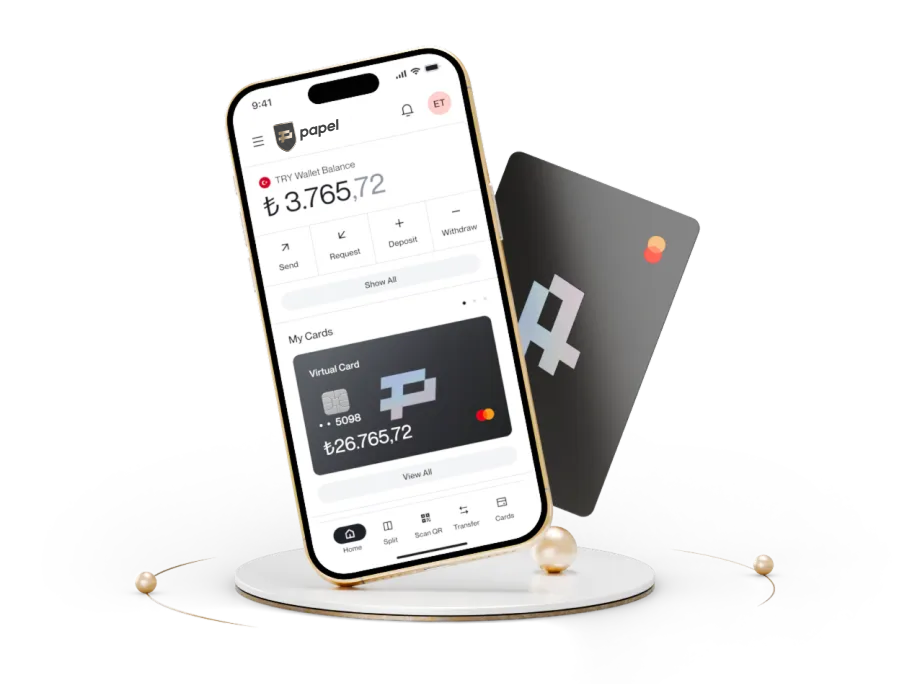The journey from traditional banking to digital transformation has been significantly enhanced by the new generation of chip-enabled Turkish ID cards, making financial transactions faster, safer, and more accessible. Today, it is possible to open an account, perform transactions, and become a customer without the need to visit a bank branch — all with just a smartphone and an ID card. These new capabilities simplify users’ lives and transform operational processes within banks. But how exactly are chip-enabled Turkish ID cards used in banking? How is security ensured? This article will explore digital banking authentication processes, their advantages, and the innovations this technology brings.
How are new-generation ID cards used in banking?
In the banking sector, new-generation chip-enabled Turkish ID cards play a crucial role in authentication processes by enhancing security and facilitating digital transactions. These cards make opening a bank account without visiting a branch possible, simplifying customer acquisition for many banks. You can easily open an account by following a few steps through a bank’s mobile application:
• Download the bank’s mobile application and select “Become a Customer” or a similar option.
• Scan the front and back sides of your new chip-enabled ID card with your phone’s camera.
• Use your phone’s NFC feature to read the data embedded in the ID card’s chip.
• Connect with a customer representative via video call to verify your identity.
• Digitally approve the necessary agreements to complete the account opening process.
What is electronic identity verification?
One critical element that enables account opening via
Internet banking or mobile applications is Electronic Identity Verification (EKDS). EKDS uses PIN codes, biometric data, and NFC technology to verify customers’ identities securely. By ensuring secure identity verification, EKDS also helps prevent risks like fraud and unauthorized access.
Advantages of using ID cards in digital banking
The use of new-generation chip-enabled Turkish ID cards, especially with the support of NFC technology, brings many benefits to both users and financial institutions:
Fast and easy identity verification
NFC-enabled devices make identity verification processes much faster. This technology eliminates the need to physically visit bank branches for account opening or other banking transactions.
Secure transactions
Chip-enabled ID cards help reduce the risk of identity fraud and provide an additional layer of security against fraudulent activities.
24/7 access and transaction convenience
Digital banking applications allow users to perform transactions anytime and anywhere, saving time and offering more flexible transaction management.
Low-cost services
Digital banking eliminates the need for physical branches and offers services at lower fees, leading to savings on money transfers (EFT, wire transfers) and account maintenance fees.
Environmentally friendly practices
Digital identity verification reduces physical documents and cards, contributing to environmental sustainability by minimizing paper consumption.
Identity verification with NFC technology
Thanks to NFC technology, the data stored in the new-generation Turkish ID card chip can be read by NFC-enabled devices without physical contact. Widely used in e-government services, banking, and financial applications, this technology allows users to perform digital transactions more securely and efficiently while improving user experience and reducing the risk of identity fraud.
To use NFC technology for identity verification:
• First, activate the NFC feature in your smartphone’s settings.
• Open the application where identity verification will be performed and follow the identity verification steps.
• As the application directs, bring your chip-enabled ID card close to your phone’s NFC reader and hold it steady.
• Once the data is read, the phone will verify identity through the application.
For optimal results, it is essential to use a device with an active NFC feature and keep the ID card still during the scanning process.
Remote customer onboarding process
The remote customer onboarding process allows individuals to become bank customers digitally without visiting a branch and has become even more accessible with the widespread adoption of chip-enabled Turkish ID cards and NFC technology. Prioritizing security, this process incorporates several safety steps, such as NFC-based ID scanning, video calls, and digital approvals, to ensure a secure and smooth customer and bank experience. Regulations introduced by the Banking Regulation and Supervision Agency (BRSA) have legally supported this service, enabling banks to verify customer identities and complete electronic agreements remotely.
The process typically begins by downloading the bank’s mobile app and selecting “Become a Customer” or a similar option to initiate the application. After entering personal details and their Turkish ID number, applicants scan their ID cards using the phone’s NFC feature to verify their identity. A brief video call with a bank representative is conducted for further verification. Finally, the necessary agreements are digitally signed, and the account is opened.
As of 2025, 20 banks in Turkey offer remote customer onboarding services, and the number of individuals who have opened bank accounts through remote applications has reached approximately 1.158 million. This service is available to anyone over the age of 18 with a new-generation chip-enabled Turkish ID card, and some banks have extended it to foreign nationals as well.
Security and data protection
Security and data protection are among the most critical digital banking concerns for individuals and financial institutions. In addition to technical measures, legal regulations play a crucial role in safeguarding the confidentiality, integrity, and accessibility of data stored, processed, and transmitted digitally.
Data protection measures include encryption, access controls, firewalls, and regular security audits. Banks implement two-factor authentication (2FA) systems using SMS codes or biometric data to provide an extra layer of security. Sensitive data is encrypted during transmission and storage to prevent unauthorized access. Firewalls, antivirus software, and regular security audits are also used to defend against external threats and assess system vulnerabilities.
In Turkey, personal data rights and freedoms are protected under the Law on the Protection of Personal Data (KVKK) No. 6698. KVKK outlines the rules and principles regarding collecting, storing, processing, and sharing personal data. Violations such as unauthorized data processing, disclosure, or access may lead to legal penalties.
While many technical and legal protections exist, individuals should also take personal precautions. Best practices include using strong and unique passwords for each account, downloading only official mobile banking applications, verifying the legitimacy of platforms before sharing personal information, and regularly updating device operating systems and apps.
Sources: 1, 2.
The information provided in this blog post is for general informational purposes only and does not constitute legal, financial, or investment advice. The content is prepared solely for informational purposes, and seeking professional advice for your specific circumstances is recommended. The statements in this article do not create any binding obligations or liabilities and solely reflect the author's opinions. All decisions and responsibilities are yours, and Papel Elektronik Para ve Ödeme Hizmetleri A.Ş. assumes no liability.



